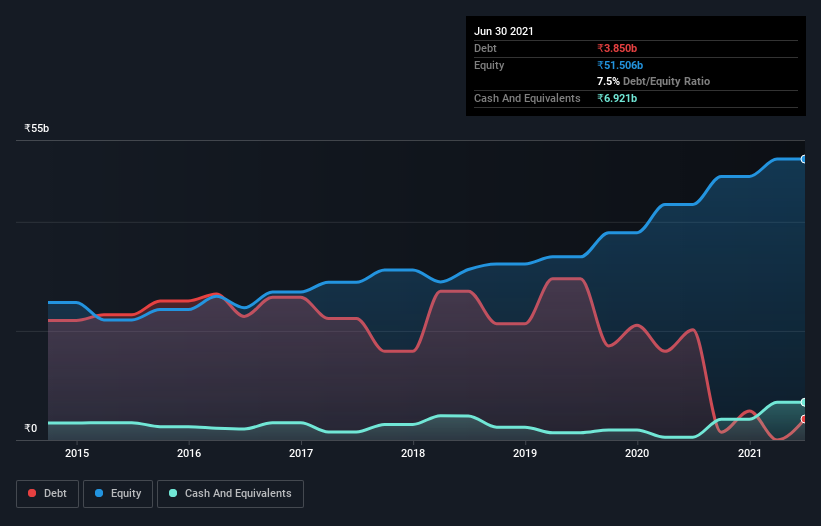Coromandel International (NSE:COROMANDEL) Seems To Use Debt Rather Sparingly

Howard Marks put it nicely when he said that, rather than worrying about share price volatility, 'The possibility of permanent loss is the risk I worry about... and every practical investor I know worries about.' It's only natural to consider a company's balance sheet when you examine how risky it is, since debt is often involved when a business collapses. We can see that Coromandel International Limited (NSE:COROMANDEL) does use debt in its business. But the more important question is: how much risk is that debt creating?
When Is Debt Dangerous?
Debt assists a business until the business has trouble paying it off, either with new capital or with free cash flow. Ultimately, if the company can't fulfill its legal obligations to repay debt, shareholders could walk away with nothing. While that is not too common, we often do see indebted companies permanently diluting shareholders because lenders force them to raise capital at a distressed price. Having said that, the most common situation is where a company manages its debt reasonably well - and to its own advantage. When we examine debt levels, we first consider both cash and debt levels, together.
View our latest analysis for Coromandel International
What Is Coromandel International's Net Debt?
As you can see below, Coromandel International had ₹3.85b of debt at March 2021, down from ₹20.2b a year prior. However, its balance sheet shows it holds ₹6.92b in cash, so it actually has ₹3.07b net cash.

How Healthy Is Coromandel International's Balance Sheet?
According to the last reported balance sheet, Coromandel International had liabilities of ₹33.0b due within 12 months, and liabilities of ₹4.43b due beyond 12 months. Offsetting this, it had ₹6.92b in cash and ₹26.8b in receivables that were due within 12 months. So its liabilities outweigh the sum of its cash and (near-term) receivables by ₹3.77b.
This state of affairs indicates that Coromandel International's balance sheet looks quite solid, as its total liabilities are just about equal to its liquid assets. So it's very unlikely that the ₹249.0b company is short on cash, but still worth keeping an eye on the balance sheet. Despite its noteworthy liabilities, Coromandel International boasts net cash, so it's fair to say it does not have a heavy debt load!
The good news is that Coromandel International has increased its EBIT by 3.2% over twelve months, which should ease any concerns about debt repayment. When analysing debt levels, the balance sheet is the obvious place to start. But ultimately the future profitability of the business will decide if Coromandel International can strengthen its balance sheet over time. So if you're focused on the future you can check out this free report showing analyst profit forecasts.
Finally, a company can only pay off debt with cold hard cash, not accounting profits. Coromandel International may have net cash on the balance sheet, but it is still interesting to look at how well the business converts its earnings before interest and tax (EBIT) to free cash flow, because that will influence both its need for, and its capacity to manage debt. Happily for any shareholders, Coromandel International actually produced more free cash flow than EBIT over the last three years. There's nothing better than incoming cash when it comes to staying in your lenders' good graces.
Summing up
We could understand if investors are concerned about Coromandel International's liabilities, but we can be reassured by the fact it has has net cash of ₹3.07b. And it impressed us with free cash flow of ₹40b, being 120% of its EBIT. So we don't think Coromandel International's use of debt is risky. The balance sheet is clearly the area to focus on when you are analysing debt. However, not all investment risk resides within the balance sheet - far from it. For example, we've discovered 2 warning signs for Coromandel International that you should be aware of before investing here.
If, after all that, you're more interested in a fast growing company with a rock-solid balance sheet, then check out our list of net cash growth stocks without delay.
If you’re looking to trade Coromandel International, open an account with the lowest-cost* platform trusted by professionals, Interactive Brokers. Their clients from over 200 countries and territories trade stocks, options, futures, forex, bonds and funds worldwide from a single integrated account. Promoted
New: AI Stock Screener & Alerts
Our new AI Stock Screener scans the market every day to uncover opportunities.
• Dividend Powerhouses (3%+ Yield)
• Undervalued Small Caps with Insider Buying
• High growth Tech and AI Companies
Or build your own from over 50 metrics.
This article by Simply Wall St is general in nature. We provide commentary based on historical data and analyst forecasts only using an unbiased methodology and our articles are not intended to be financial advice. It does not constitute a recommendation to buy or sell any stock, and does not take account of your objectives, or your financial situation. We aim to bring you long-term focused analysis driven by fundamental data. Note that our analysis may not factor in the latest price-sensitive company announcements or qualitative material. Simply Wall St has no position in any stocks mentioned.
*Interactive Brokers Rated Lowest Cost Broker by StockBrokers.com Annual Online Review 2020
Have feedback on this article? Concerned about the content? Get in touch with us directly. Alternatively, email editorial-team (at) simplywallst.com.
About NSEI:COROMANDEL
Coromandel International
Provides agriculture solutions in India and internationally.
Flawless balance sheet average dividend payer.

